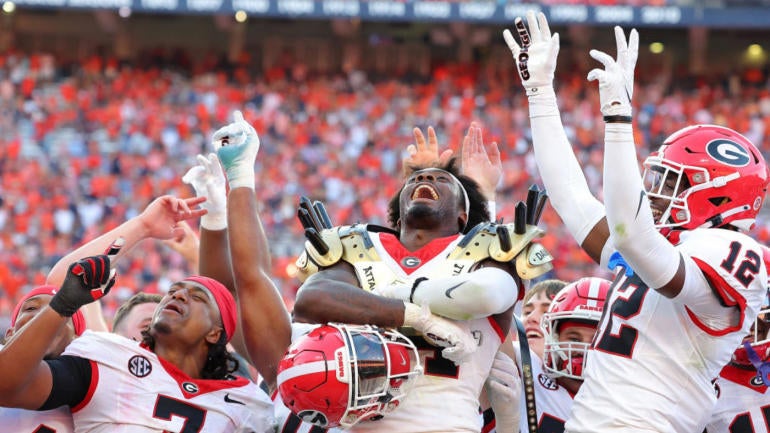
It's time to rethink what it means to win the turnover battle. It's a cliche uttered by everybody in football -- coaches, players and media alike. Early in every television broadcast, an analyst presents the "keys to the game," and almost without fail, one of them is to "win the turnover battle."
It isn't a brilliant observation to say taking the ball away from your opponent while not giving it away helps you win games. It does. However, numbers show forcing turnovers is less important than what you do next.
Turning that extra possession into points means more.
Here's a chart showing the top 20 teams in the country by turnover margin over the last seven seasons in games against FBS competition.
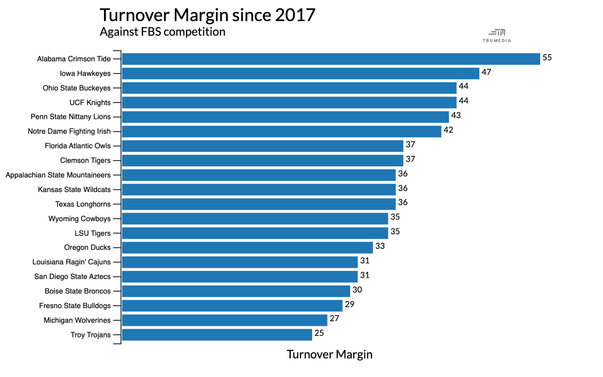
It shouldn't come as a surprise that most of the teams appearing in the chart have been successful on the field. But watch what happens when we look at points-off-turnover margin (points scored off turnovers minus points allowed off turnovers) per game.
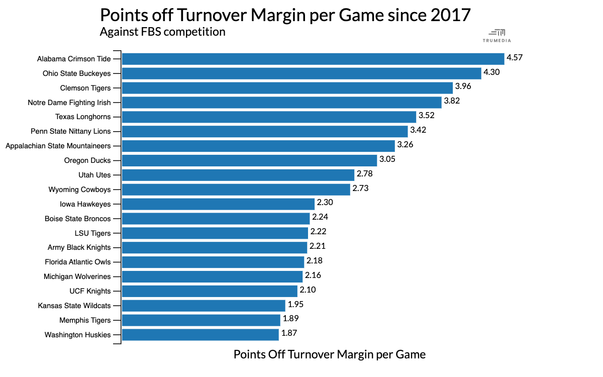
In the first chart, which was strictly turnover margin, five teams that have won a national title in the College Football Playoff Era are in the top 20, while eight have made the CFP. When we changed to points-off-turnover margin there were still five national championship winners in the top 20, but the top three teams have all won a title. Furthermore, nine of the 20 have reached the CFP, including the top five teams.
It's not a coincidence, but the correlation is better shown by looking at both statistics in relation to a team's win percentage. After all, not every team can realistically compete to win a national title, but all are trying to win games on Saturday.
We'll start with simple turnover margin compared to win percentage. Like the previous charts, this is strictly against FBS competition. Also, I've limited it to teams that have played at least 50 games at the FBS level, so apologies to newcomers like James Madison. It's not you; it's your sample size skewing the results.
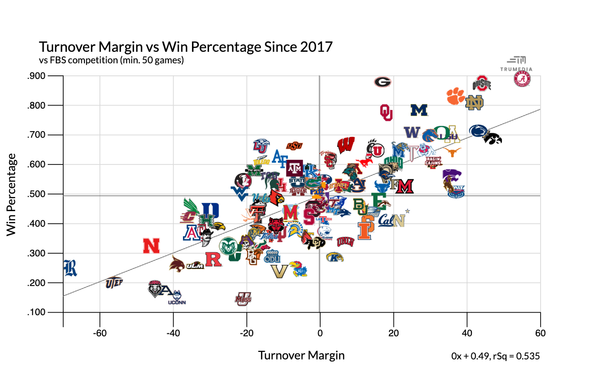
There's a correlation here, but there's also plenty of noise. Look at how much tighter things get when we change to points-off-turnover margin per game.
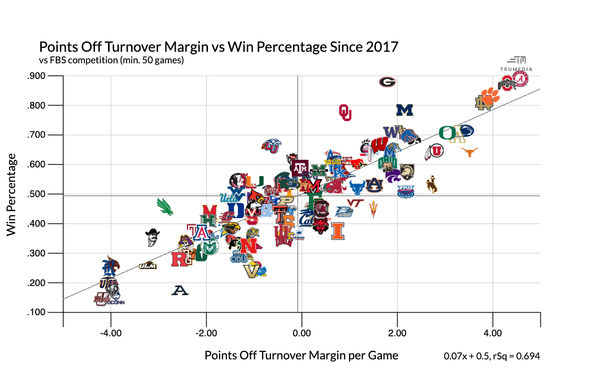
Notice how much more bunched up everybody becomes? That shows more correlation between points off turnovers and winning than simply forcing turnovers. The top right portion of the graph is filled with teams that have won national titles and compete for conference titles annually. Meanwhile, the bottom left is filled with teams the top right schedules when it needs a week to relax.
But wait, there's more. And it has to do with many of the teams we see on the bottom left. We've seen that points off turnover margin correlates to winning, but the teams on the top right aren't so much relying on it as forcing the issue. These teams have more talent and can overwhelm opponents without turnovers. More than anything, they're a cherry on top of a victory sundae.
What about the teams who don't have that talent advantage? The teams that truly have to win around the margins. Well, not surprisingly, there's an even stronger correlation in what we used to call the Group of Five ranks than the former Power Five conferences (though both remain strong). Here's a look at both to compare for yourself.


The correlation is downright startling on the Group of Five chart, but here's another fun stat just in case the pretty pictures aren't enough to convince you. Of the 10 (11 if we include James Madison, which was ineligible) Group of Five teams to reach their conference title game last season, only three (Toledo, New Mexico State and Liberty) finished with a negative points-off-turnover margin in conference play. Liberty was the only one of those three to win a conference title.
Next, we'll look at the entire country. Of the top 25 teams in points-off-turnover margin per game, only three (Arkansas State, Buffalo and Sam Houston State) finished with a losing record.
So, the next time somebody tells you you have to win the turnover battle, let them know that what you do with that turnover is far more important than simply forcing it.
















